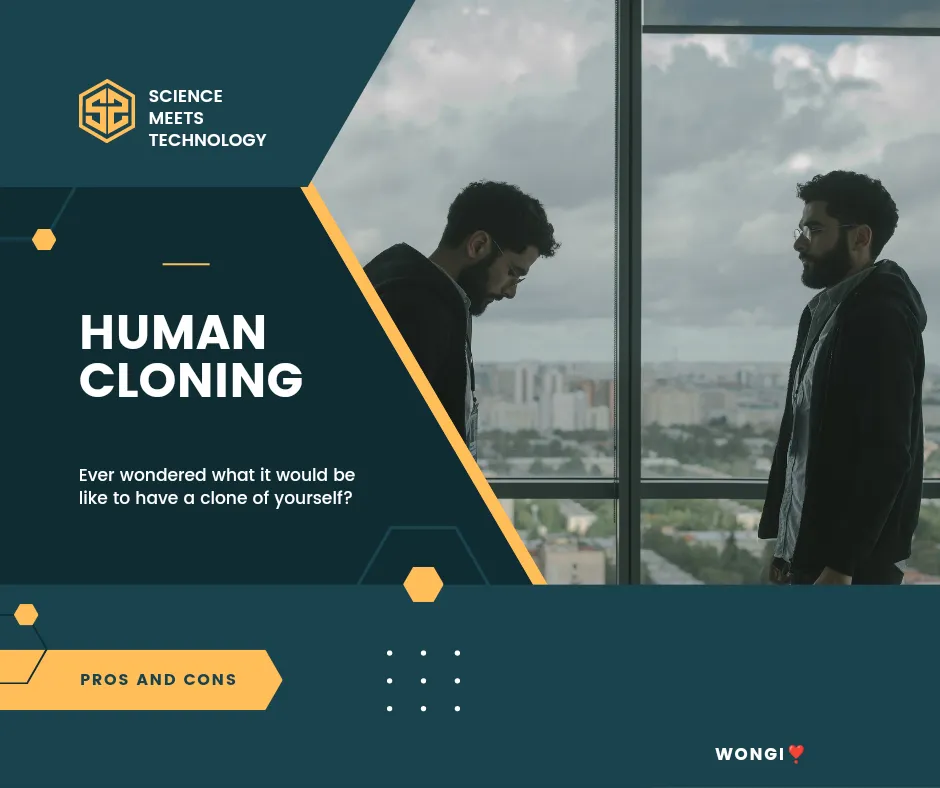Have you ever imagined what it would be like to have an actual clone of yourself?. Someone who has the same genetic make-up like you? The same face, same stature, same attitude? It sounds frightening to some people while some other people would perceive it as cool. Having a clone of yourself comes with its pros and cons. I'd be discussing this today.

Image source|| Edited with canva
What is Human Cloning?
This is the active replication of human cells and tissues or the creation of an exact genetic copy of an individual. It's worthy to note that human cloning has got nothing to do with the conventional / natural conception of twins.
1997 was the year of cloning. The internet went wild with the revelation of the first mammal clone–Dolly the sheep. On Dec. 27, 2022, Brigitte Boisselier (a french chemist) announced the birth of the first human clone,Eve. This announcement was made in Florida, just a few days after the Christmas celebration.
Although human cloning is not accepted by many, it is still an active area of research. Some states like–Virginia, Arizona, Oklahoma, north and south Dakota– strongly kick against human cloning.
Where am I getting with all these?
This particular topic piqued my attention during my research because it's a combination of medicine and technology. Genetic replication is involved( medicine) and technology is used to make this replication feasible.
Types of Human Cloning
There are basically two types of human cloning; human therapeutic cloning and reproductive cloning.
Human Therapeutic Cloning
This type of cloning should interest the medics in the house. Human therapeutic cloning involves the creation of cells and tissue identical to that of the patient.
There have been cases where a patient died because their bodies rejected a certain organ during an organ transplant. With human therapeutic cloning, the cells of such a patient could be used to make a clone that would fit perfectly. No one gets to die because of incompatibility anymore.
Reproductive Cloning
This has to do with the replication of the entire being or animal, just like in the case of Dolly the sheep or Eve. Twins are an example of natural clones but when technology is involved, then it gets artificial.
This involves creating an animal that is genetically identical to the original donor through the process of somatic cell nuclear transfer.
The difference between therapeutic cloning and reproductive cloning is that the former involves cloning of only one particular organ while the latter involves making an entire human or animal.
There would always be pros and cons when it comes to artificiality and technology. And I'm going to state a few of them.
Pros of Human Cloning
- It can be used to produce genetically identical cells for medical purposes.
- Infertility treatment: couples who are infertile could get a chance of having an infant who is genetically related to one of them.
- Revolutionizing of the medical sector.
Cons of Human Cloning
As the science of human cloning is still in its early stage, there are a lot of uncertainties and doubts.
- Ethical concerns: many people kick against the idea of human cloning.
- Psychological impact on the clones: the clones may struggle with their identity and self worth.
- Potential for abuse(very inevitable): As there are two of you(clones), one clone may decide to get dubious at some point while the other clone gets to pay.
- Technical challenges
- Genetic abnormalities/ birth defects.
Disclaimer: the clones have entirely different thoughts. One may think that the original donor and his clone would have the same line of thoughts. That's not the case. Your clone could be in a different state, doing something absolutely different from you. They are clones but their minds are not in sync.
Just like artificial intelligence (AI) came upon us, human cloning may come upon us soon. Scientists are a very eager set of people and they never stop till their goal is achieved irrespective of how long it takes.
We should look on the brighter side. More lives would be saved and less people would have to die because of incompatibility or inaccessibility to organs. Human cloning would bring a revolution to the medical sector, if and only if scientists play their cards right.
I'd love to hear your thoughts on human cloning. Do you like the idea or the idea should be abolished?.
Thank you for your time
With love, wongi ✨